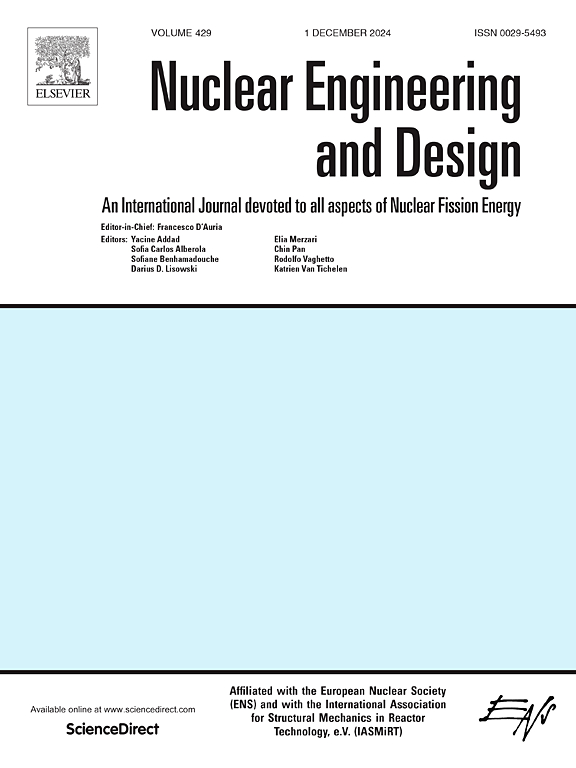Sub-channel analysis of the influence of the ATF cladding corrosion on thermal hydraulic behaviors
IF 1.9
3区 工程技术
Q1 NUCLEAR SCIENCE & TECHNOLOGY
引用次数: 0
Abstract
Accident-tolerant fuel (ATF) enhances the accident tolerance of the fuels by improving its thermal properties and antioxidant radiation performance, thereby enabling the reactor to withstand severe accidents for a long time. This article applies and improves heat transfer and CHF models in the COBRA-EN by considering the impact of cladding surface corrosion on critical heat transfer between coolant and fuel rods. We conduct detailed and critical validation of the model constructed in this paper based on two benchmark experiments. We apply this model to study the thermal–hydraulic behaviors of ATFs under accident conditions. We obtain parameters such as the maximum fuel centerline temperature (MFCT), the maximum cladding surface temperature (MCT), the minimal departure from nucleate boiling ratio (MDNBR), the critical heat flux (CHF), and the average void fraction (AVF) for different ATFs. The results indicate that under most transient operating conditions, cladding corrosion delays the soaring time of the MFCT and MCT, and generally enhances CHF, with an average enhancement amplitude of over 0.15 MW/m2. At the same time, due to the effect of cladding corrosion, the MDNBR of the reactor has also been improved, which mitigates the impact of the accident to some extent.
ATF 覆层腐蚀对热液压行为影响的子通道分析
事故耐受燃料(ATF)通过改善燃料的热性能和抗氧化辐射性能来提高燃料的事故耐受性,从而使反应堆能够长期承受严重事故。本文通过考虑包壳表面腐蚀对冷却剂和燃料棒之间临界传热的影响,应用并改进了 COBRA-EN 中的传热和 CHF 模型。我们基于两个基准实验对本文构建的模型进行了详细而关键的验证。我们应用该模型研究了 ATF 在事故条件下的热液压行为。我们获得了不同 ATF 的最大燃料中心线温度 (MFCT)、最大包壳表面温度 (MCT)、最小离核沸腾比 (MDNBR)、临界热通量 (CHF) 和平均空隙率 (AVF) 等参数。结果表明,在大多数瞬态运行条件下,包层腐蚀会延迟 MFCT 和 MCT 的沸腾时间,并普遍增强 CHF,平均增强幅度超过 0.15 MW/m2。同时,由于包壳腐蚀的影响,反应堆的 MDNBR 也得到了改善,在一定程度上减轻了事故的影响。
本文章由计算机程序翻译,如有差异,请以英文原文为准。
求助全文
约1分钟内获得全文
求助全文
来源期刊

Nuclear Engineering and Design
工程技术-核科学技术
CiteScore
3.40
自引率
11.80%
发文量
377
审稿时长
5 months
期刊介绍:
Nuclear Engineering and Design covers the wide range of disciplines involved in the engineering, design, safety and construction of nuclear fission reactors. The Editors welcome papers both on applied and innovative aspects and developments in nuclear science and technology.
Fundamentals of Reactor Design include:
• Thermal-Hydraulics and Core Physics
• Safety Analysis, Risk Assessment (PSA)
• Structural and Mechanical Engineering
• Materials Science
• Fuel Behavior and Design
• Structural Plant Design
• Engineering of Reactor Components
• Experiments
Aspects beyond fundamentals of Reactor Design covered:
• Accident Mitigation Measures
• Reactor Control Systems
• Licensing Issues
• Safeguard Engineering
• Economy of Plants
• Reprocessing / Waste Disposal
• Applications of Nuclear Energy
• Maintenance
• Decommissioning
Papers on new reactor ideas and developments (Generation IV reactors) such as inherently safe modular HTRs, High Performance LWRs/HWRs and LMFBs/GFR will be considered; Actinide Burners, Accelerator Driven Systems, Energy Amplifiers and other special designs of power and research reactors and their applications are also encouraged.
 求助内容:
求助内容: 应助结果提醒方式:
应助结果提醒方式:


